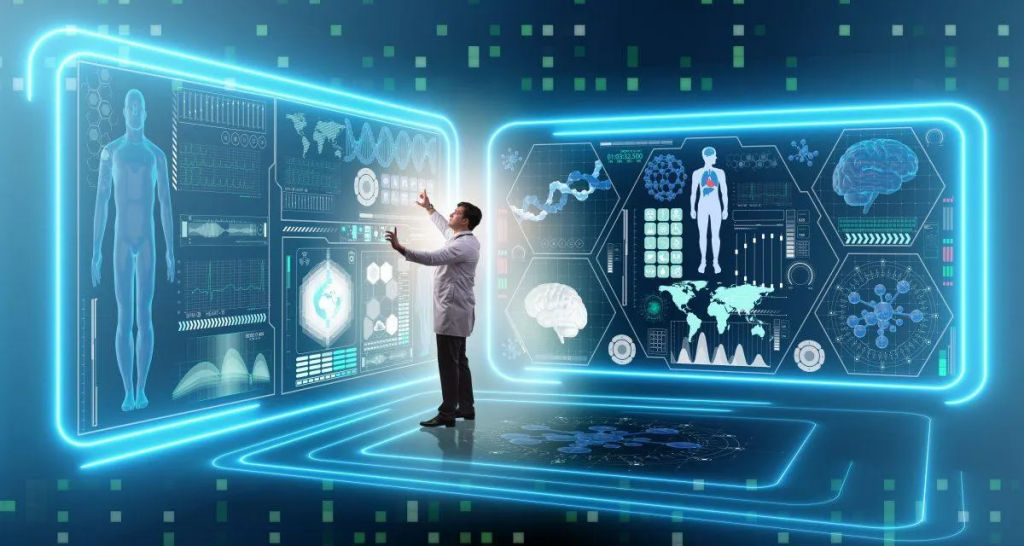In recent years, the integration of artificial intelligence (AI) and machine learning (ML) technologies into healthcare has paved the way for transformative changes in patient care. From early disease detection to personalized treatment plans, AI-powered solutions are revolutionizing the healthcare landscape. This article explores how machine learning is reshaping patient care and driving improvements across various healthcare domains.
What is Artificial Intelligence (AI)?
What is Artificial Intelligence (AI)? Artificial Intelligence (AI) is a transformative field of computer science that focuses on creating intelligent machines capable of performing tasks that typically require human intelligence. These tasks include learning, reasoning, problem-solving, perception, natural language understanding, and even creativity. AI has evolved significantly over the years, becoming an integral part of various industries and shaping the way we interact with technology.
Enhanced Disease Detection and Diagnosis
- Machine learning algorithms can analyze vast amounts of medical data, including patient records, diagnostic images, and genetic information, to identify patterns and trends that may indicate the presence of diseases.
- AI-powered diagnostic tools, such as image recognition systems and natural language processing algorithms, assist healthcare professionals in accurately diagnosing conditions at an earlier stage.
- By leveraging ML models, healthcare providers can reduce diagnostic errors, improve the accuracy of diagnoses, and enhance overall patient outcomes.
- Examples of ML applications in disease detection include the early identification of cancerous lesions in medical imaging scans and the prediction of patient risk factors based on genetic predispositions.
Personalized Treatment Plans and Precision Medicine
- Machine learning enables the development of personalized treatment plans tailored to individual patient needs by analyzing various factors, including genetic makeup, medical history, lifestyle choices, and treatment responses.
- ML algorithms can predict how patients will respond to specific treatments or medications, allowing healthcare providers to optimize treatment regimens and minimize adverse effects.
- Precision medicine initiatives leverage AI to match patients with the most effective therapies based on their unique genetic profiles, leading to improved treatment outcomes and better disease management.
- Through continuous learning from patient data, ML models can adapt treatment recommendations over time, ensuring that interventions remain effective as patients’ conditions evolve.
Predictive Analytics for Preventive Care
- AI-powered predictive analytics models analyze patient data to identify individuals at high risk of developing certain medical conditions or experiencing adverse health events.
- By forecasting potential health outcomes, healthcare providers can implement preventive measures and interventions to mitigate risks and prevent disease progression.
- ML algorithms can analyze various data sources, including electronic health records, wearable devices, and lifestyle indicators, to generate personalized risk assessments and proactive health management strategies.
- Predictive analytics in healthcare not only improve patient outcomes but also reduce healthcare costs by minimizing the need for emergency interventions and hospitalizations.
Streamlined Administrative Processes and Workflow Optimization
- Machine learning algorithms streamline administrative tasks and optimize healthcare workflows by automating repetitive processes, such as appointment scheduling, billing, and documentation.
- AI-powered chatbots and virtual assistants enhance patient engagement and satisfaction by providing instant responses to inquiries, appointment reminders, and personalized health recommendations.
- ML models can analyze historical data to identify inefficiencies in healthcare operations and suggest workflow improvements to enhance resource allocation and patient throughput.
- By automating administrative tasks, healthcare providers can focus more on patient care, leading to improved efficiency, reduced administrative burden, and better overall healthcare delivery.
Conclusion:
The integration of machine learning and artificial intelligence technologies into healthcare is revolutionizing patient care across various domains. From enhanced disease detection and personalized treatment plans to predictive analytics for preventive care and streamlined administrative processes, AI-powered solutions are driving improvements in healthcare delivery, patient outcomes, and operational efficiency. As these technologies continue to evolve, the future of healthcare holds immense promise for leveraging AI to improve health outcomes and enhance the overall patient experience.
